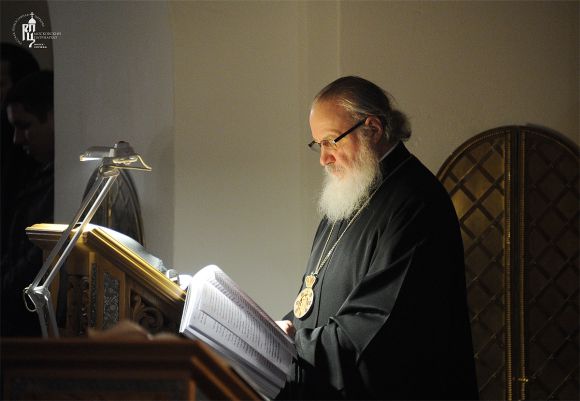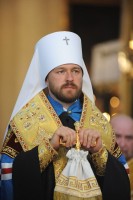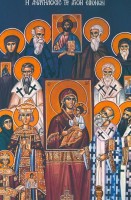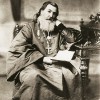The Holy Church has almost led us to the sacred days of the holy Forty Days, “for the cleansing of soul and body, abstinence from passions, and the hope of the resurrection.”
The days start grandly and the usual character of the Church’s divine services changes.
During the first week of Lent the Church puts aside the usual brightness and solemnity of its rites in order to show us palpably the need for humble repentance, spiritual contrition, and reflection on the loss of both paradise and of the innocence of heart of each one of us.
During the first week of Great Lent the sweet-sounding hymnody ceases, and in its place we hear more often the penitential psalms of David and the prayer of St. Ephraim, asking that the Lord not give us a spirit of idleness, despondency, ambition, and idle talking; but rather a spirit of chastity, humble-mindedness, patience, and love.
In antiquity the Egyptian desert-dwellers would gather on this day for their last common prayer; having asked forgiveness and blessings of one another, they dispersed after Vespers to the desert and their cells for solitary struggle for the continuation of the holy Forty Days. The monastery gates were closed until Palm Sunday, when the desert-dwellers would return to church, having spent forty days in the desert in prayer and fasting like the Savior.
The Church always commands reverence as we stand in church, but this is especially the case in the coming week. Do know that it has positively prohibited all conversations during the divine services this week. So as not to become distracted, the Church advises us to think during this time about our sins, to recall the inevitability of death for each one of us, and to recall the future joy that awaits the righteous and the terrible torments that await sinners.
Attending the divine services during the first week, delve into their peculiarities. The readings and hymnography are intended to make us remember our sins and to turn to God.
During the first five days of Lent the history of man’s fall into sin is conveyed. Man always sins from lack of self-control. Adam and Eve, because of lack of self-control, were not able to eat the fruits of the tree of life; Communion of the Body and Blood of the Lord does not serve for the benefit of Christians who lack self-control.
During the first five days we hear the stern voice of the Prophet Isaiah against hypocritical fasting and superstitious remorse. In the name of God the prophet says: Your new moons and Sabbaths and high days I do not endure; fast and holiday and your feasts My soul hates; you have become an excess for Me, I shall no longer forgive your sins. When you stretch out your hands to Me, I shall turn away My eyes from you; and if you multiply supplication, I shall not listen to you; for your hands are full of blood… Learn to do good, seek out judgment, deliver the wronged, judge for the orphan and do justice to the widow [Isaiah 1: 14, 17; read on Clean Monday].
This is what true fasting consists of. “While fasting physically, brethren, let us also fast spiritually. Let us loose every knot of iniquity; let us tear up every unrighteous bond; let us distribute bread to the hungry, and welcome into our homes those who have no roof over their heads, so that we may receive great mercy from Christ our God!” [Vespers for Clean Wednesday]
And again: Do not plot evils against your friend who lives near you and trusts you. Do not quarrel with someone without cause… The Lord resists the proud; but to the humble He gives grace [Proverbs 3:29; 34; read on Clean Friday].
The canon of repentance read at Compline invokes a feeling of special compunction and a pious disposition in the soul… The entire canon is nothing but a conversation with one’s own soul, with one’s own conscience…
Therefore, brethren, let us begin the fast by God’s mercy. Let us not fast bodily only, but above all spiritually… Let us purify our minds through dispassion, our hearts through purity, and our will through the unswerving accomplishment of our Christian and human duties. May the fast serve you, as the Church prays, for sanctification and enlightenment, for strength and health of soul and body, and for the destruction of evil thoughts, intentions, and works. Amen.
Translated from Russian.
You might also like
About Great Lent by Protodeacon Andrei Kuraev




















